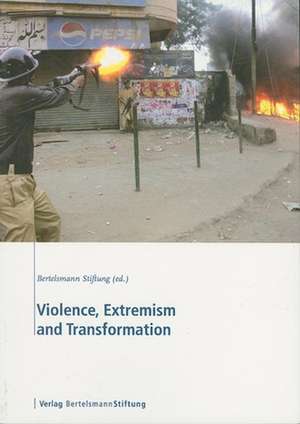Violence, Extremism, and Transformation
Autor Bertelsmann Stiftungen Limba Engleză Paperback – feb 2008
Based on the results of the Bertelsmann Transformation Index 2006 (BTI), this study challenges widespread assumptions and stereotypes about the nature of political violence. The book reminds us that religious extremism, while on the rise, accounts for only a small fraction of armed conflict in the world. Moreover, Western countries' preoccupation with transnational terrorism is misleading, as most political violence has been and remains local in its origin and its area of activity. The results call for a more differentiated assessment of the threats posed by militants and extremists. If political violence and terrorism are still predominantly homegrown, the multitude of local causes, such as socioeconomic grievances or state weakness, should receive more attention. In any comprehensive effort to foster stability, political institutions will have to play the pivotal role.
Preț: 85.64 lei
Preț vechi: 136.17 lei
-37% Nou
Puncte Express: 128
Preț estimativ în valută:
16.39€ • 17.80$ • 13.77£
16.39€ • 17.80$ • 13.77£
Carte indisponibilă temporar
Doresc să fiu notificat când acest titlu va fi disponibil:
Se trimite...
Preluare comenzi: 021 569.72.76
Specificații
ISBN-13: 9783892049210
ISBN-10: 3892049211
Pagini: 180
Dimensiuni: 152 x 229 x 8 mm
Greutate: 0.17 kg
Editura: Brookings Institution Press
Colecția Verlag Bertelsmann Stiftung
ISBN-10: 3892049211
Pagini: 180
Dimensiuni: 152 x 229 x 8 mm
Greutate: 0.17 kg
Editura: Brookings Institution Press
Colecția Verlag Bertelsmann Stiftung
Descriere
Based on the results of the Bertelsmann Transformation Index 2006 (BTI), this study challenges widespread assumptions and stereotypes about the nature of political violence. The book reminds us that religious extremism, while on the rise, accounts for only a small fraction of armed conflict in the world. Moreover, Western countries' preoccupation with transnational terrorism is misleading, as most political violence has been and remains local in its origin and its area of activity. The results call for a more differentiated assessment of the threats posed by militants and extremists. If political violence and terrorism are still predominantly homegrown, the multitude of local causes, such as socioeconomic grievances or state weakness, should receive more attention. In any comprehensive effort to foster stability, political institutions will have to play the pivotal role.
